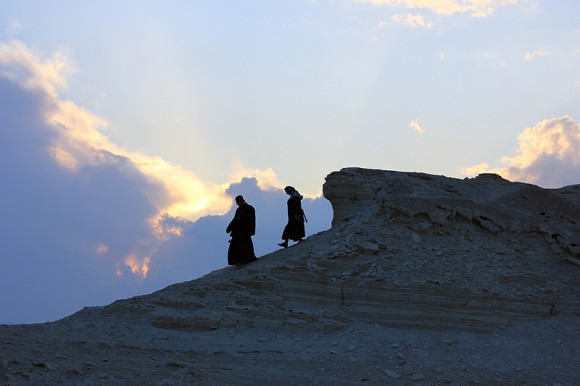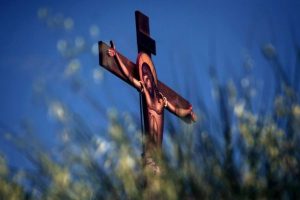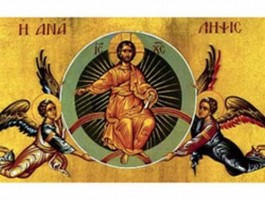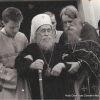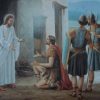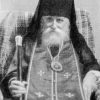As if in answer to this question, the Holy Church at the same time opens the doors for us and says: The Tree of Life of Paradise is already restored — the Eucharist, the Body and Blood of Christ. For each of us the doors are open: come and see, take and receive. Here is that great dogma which was revealed by the Lord in the restoration of that great thing which was lost by Adam — the Tree of Life. “Whoso eateth My Flesh, and drinketh My Blood hath eternal life; and I will raise him up at the last day” (Jn. 6:54). He who eats the Flesh and drinks the Blood of Christ has life eternal, but…
Here the Holy Church defines this “but” for us. What is this “but”? The doors are open. The Eucharist is prepared. The Holy Church is prepared to receive each of us in the Divine Liturgy. But for this, it is necessary for us to be prepared. What does this “preparation” consist of? This day, the day we call the Sunday of the Holy Fathers, gives us the answer. Here begins the establishment of rules which a Christian must follow in order to receive the New Testament Tree of Life — the Body and Blood of Christ — which will give life to man.
And how does one receive this great Sacrament? The Holy Church answers us with this day. She presents the First Council of Nicaea in 325 A.D., at which the Holy Fathers gathered in order to destroy the heresy which was created by Arius. What kind of heresy was it? Does it concern us? Not only does it concern us, brothers, but if we do not fulfill the testaments of the Church, and if we do not understand the disturbance made by Arius, we will not be Orthodox Christians.
What is this “but” of Arianism? The Apostle Paul, while walking around Athens, found a sacrificial altar to the unknown God. And while preaching in the Areopagus, as related in the Acts of the Apostles, he announced that this Unknown God is Christ. And the Athenians willingly accepted it; they began worshipping the true God in the same way the Apostle Paul preached to them. To worship God and recognize His greatness, this they could do. But live according to God, they did not want to do. They did not want to live the way the Gospel required. First of all, there was a disturbance in their family life — they practiced polygamy. In public life, they were having a terrible political battle — slavery. A human being was not a human being in relation to his Creator. Relations between people were terrible, based on slavery. And here this desire to live in a pagan way became so strong among the Athenians, that it started to speak up even in the Church of Christ. And Arius became the ideologist for it.
What did he say? When the Council gathered and began to expose Arius, he said: “You Fathers say, Christ is God-Man. His Divinity and His Manhood are unchangeable and indivisible; one is in the other, so that it is impossible to tell what is in what. There is no separation between God and Man. Therefore, you make the conclusion that a Christian must always and everywhere be a Christian — in his family life and in his social life — always and everywhere be a Christian.
“But I say,” said Arius, “that Christ is God and Man. His Divinity and His Manhood are divisible in Him. And this gives us the right also to separate our life: in regard to religion to be Christians, to worship Christ; but in our private and civic life to live the way we want, as we lived before, in a pagan way.”
To this the Holy Fathers said to Arius: “Then you, Arius, and your followers cannot be Christians. You do not understand the meaning of Christ’s coming down to earth. Christ was incarnate, not only to reveal to us the true teaching about God, but also to live according to God. He came on earth to fulfill the commandment of love for God and neighbor. And He requires fulfillment of this commandment from us. Those who do not fulfill this commandment will remain pagans and will receive the same thing that pagans receive/’
This is how the Holy Fathers answered Arius. And this is what the Holy Church says to us even now. Look around us and you will see in action all those horrors and sights about which the Holy Fathers spoke: modern-day wars with their bombs, forgotten old age, and the madness which is now going on among the young generation. Horrors!
In order to avoid these horrible things we have to be Orthodox Christians. And a Christian cannot be a Christian and a citizen. Rather, in citizenship he must be a Christian, which means always to be just a Christian. Only then will we be able to partake of Eternal Life with divine joy in Christ.












